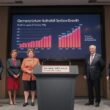Shifting Sands: Domestic Tourism Buoys Germany’s Accommodation Sector Amidst Declining International Arrivals
Preliminary data released Friday by the Federal Statistical Office (Destatis) reveals a complex picture of Germany’s tourism landscape. While accommodation providers recorded 59.4 million overnight stays in August 2025, a slight increase of 0.7% compared to the same period in 2024, a deeper dive into the figures exposes a concerning trend: a significant decline in international tourism offsetting gains made by domestic travelers.
The August figures illustrate this divergence sharply. Overnight stays by domestic guests rose by 1.6% to reach 49.7 million. Conversely, international visitors accounted for just 9.8 million overnight stays, a drop of 3.8%. The reliance on internal tourism to maintain overall growth raises questions about the long-term resilience of Germany’s accommodation sector, particularly given geopolitical uncertainties and fluctuating exchange rates that can impact international travel decisions.
Extending the analysis to the January-August period, the total overnight stays registered 339.2 million, only marginally below the peak of 339.4 million recorded in the same period last year. However, the persistent pattern remains: a 0.6% increase in domestic overnight stays (reaching 282.7 million) is counterbalanced by a 3.1% decrease in international visitor nights, totaling 56.5 million.
The decline in international tourism presents a challenge for policymakers. While the rise of domestic tourism offers a crucial buffer, relying solely on internal travel is hardly a sustainable strategy for a nation heavily invested in the international tourism industry. Potential factors contributing to this downturn include the ongoing impact of the pandemic, shifts in global travel preferences and the rising cost of travel-a particularly relevant concern for visitors from key markets like the United States and the United Kingdom.
Furthermore, the data reinforces debates surrounding Germany’s tourism strategy. While domestic promotion remains a valuable tool, the need to actively attract and retain international tourists is undeniable. Strategies focused on diversifying tourism offerings beyond traditional destinations and addressing concerns relating to perceived value for money will be crucial in mitigating further declines and ensuring a vibrant and balanced tourism sector moving forward. The long-term impact on related industries – from transportation to hospitality – warrants close monitoring and proactive policy interventions.





